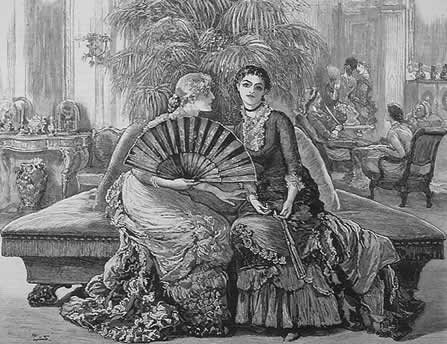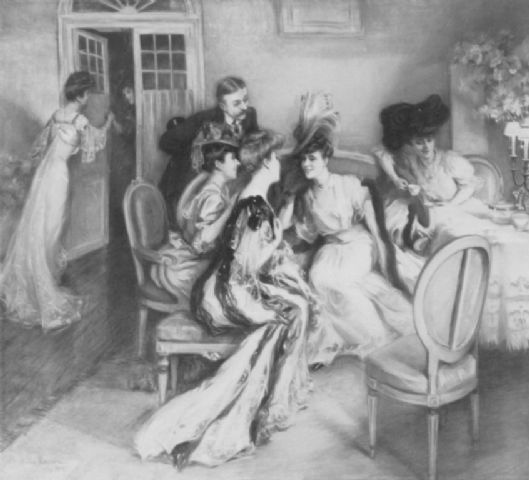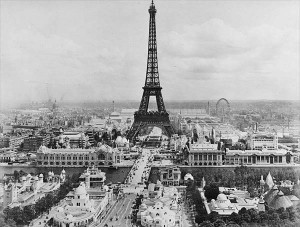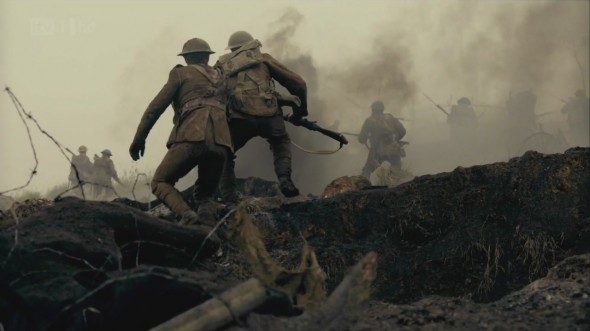
The growing prevalence of a Yankee accent, indigenous or acquired, in smart drawing-rooms today, significantly betrays the New World leaven continually at work. Oddities of pronunciation are but the outward and audible sign of novelties in ideas. The nasal intonation reminds one that, on both sides of the Atlantic, social ideas increasingly conform to the same type. The Briton of either sex, newly arrived from the greatest of the Dependencies beneath the Southern Cross, instinctively sympathises with every sign of the Americanising process.
Gradually the new-comer realises the startling degree to which levelling-down processes have been going forward in the “old country.” Times have been bad. On every side his acquaintances of past years have experienced droll or tragic vicissitudes. Ladies, once little queens of their set, have been left to their own resources, and now manage establishments that would once have passed by the blunt name of boarding-houses. Others of the same gentle birth, if caught unawares, may be found in some Bond Street emporium of aesthetic curiosities, or are engaged in establishments of chiropody and manicure.
The boys who were to have gone into the Guards or into diplomacy have been compelled to earn their livelihood by any work they can find. If, lacking the influence for a start in the City, they have found a stool in the office of an auctioneer or West End house-agent, with good luck who knows but that a little time hence they may not win their promotion to the managing directorship of a residential hotel and chambers, like Colonel Kenney Herbert, who, if he is not exactly in Society, can create it for himself; can rebuild the Tower of Babel as easily as he can grill a cutlet or as deftly as he can compound a curry or a salad.
Other sons of the house were shipped off to Canada with a few pounds in their pocket, to sink or swim; they tried, but soon gave up, farming; they then gradually elbowed their way into little businesses, the grocery line for choice. Some day or other they may return with a fortune in their pockets to the land of their birth. Meanwhile the ocean post keeps open their line of communications with it, and reassures their friends as to their existence. The more imperial, therefore, the spirit of the age, the closer the intimacy between the Mother Country and its trans-oceanic settlements; the greater the commerce between its component parts, with their widely different social ideals, the weaker will grow the historic sentiment against manual employment as below the dignity of the gently-born Briton.
Indeed the influence of those traditional seats of patrician training, the English public schools, operates in the same direction. It seems at first unreasonable to expect a professional parent to pay £300 a year for his son, from the age of fourteen to eighteen, in order that the boy may learn little more than what an accomplished maid-of-all-work could teach him in a single morning. To frizzle a rasher for his fag-master nicely, to light his fire, to fetch his hot water, and to keep the room tidy, are the first duties in which an Eton youngster must perfect himself.
Together with the habits of manly self-reliance, of courage, and of positive dislike for intellectual or sedentary labour of any kind, which the costly school-life inculcates, it constitutes an effective, if a rather dear, preparation for colonial success. Strength, rather than receptiveness of new ideas, is an aristocracy’s characteristic. The alliance, however, between counter and coronet has produced some modification even here. Canadian boys in every station are brought up, like the Jews of old, to some trade. One of the Dominion’s latest Viceroys, the blameless Earl of Aberdeen, has profited by the social precedent of the country he ruled so far as to adopt its practice—i.e., he has started one of his sons in the craft of quarryman.
Many years ago, when the Irish troubles were beginning, Lord Cork made it a condition of his sons going to their father’s old school, that they should win their way into “college” at Eton. Society protested at the time, but has largely profited by the example. Other lads of noble birth are continually being sent into the manufactories or railway works, where their sires have influence. All this is in the same spirit as the smart alliances between trade and birth. Class fusion is, in truth, not the monopoly of the superior orders; the humblest as well as the highest share in it.
– Society in the New Reign by A Foreign Resident (1904)




